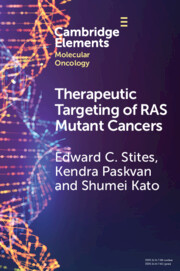Refine search
Actions for selected content:
2 results

Therapeutic Targeting of RAS Mutant Cancers
-
- Published online:
- 26 August 2022
- Print publication:
- 15 September 2022
-
- Element
- Export citation
Association of KRAS gene mutations with depression in older metastatic colorectal cancer patients
-
- Journal:
- International Psychogeriatrics / Volume 28 / Issue 12 / December 2016
- Published online by Cambridge University Press:
- 29 July 2016, pp. 2019-2028
-
- Article
- Export citation
